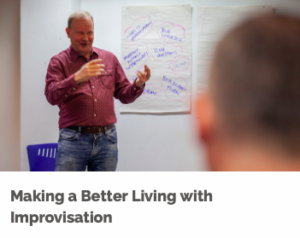Participants resisting your training activities? It could be the size of the steps

One of my colleagues was preparing to facilitate a corporate event for 200 or so people in a conference room, and she was worried.
She wanted to lead them through a physical activity in random pairs, in which the partners would alternate a count to 3.
It’s a classic improvisational warm-up activity designed to generate experiences of connection, then insights about flow. Elena was fine with the game itself. Her concern was about group resistance before they got to play.
In fact, facilitators consistently put, ‘How do I deal with resistance?’ at the top of their lists of questions during our training programmes.
They have usually experienced something along these lines:
-
Questions from participants about ‘the relevance’ of what they are asked to do
-
Feelings of discomfort expressed as, ‘I don’t want to do that’
-
If discussed further, participants say they expect an activity to be silly or to expose them to embarrassment
And from the facilitator perspective when that happens, these forms of resistance have to be overcome, because the activity is in the plan for a good reason. By doing it we’re expecting to get closer to what we’re here to accomplish – and it’s the facilitator’s job to take us along that path.
In Elena’s case, she had only 50 minutes for a session aimed at: ‘loosening patterns and habits of being’. The counting activity would bridge to a conversation about how to change habits. Elena didn’t want to spend valuable time dealing with objections. Nor did she want to ignore them, if that meant participants wouldn’t engage fully with the process.
So we hatched a plan to make each step appear natural, easy or even inevitable.
How to make the steps appear natural, easy or even inevitable
That’s a great aspiration for any facilitated process and you can do it by preparing the ground almost invisibly before each potentially resistable step is activated.
Elena began by pre-empting the ‘relevance’ question. She explained that we can all deliberately make simple changes – such as looking in a different direction or saying one word instead of another – and that changing habits is a more elaborate extension of this skill. This set a clear expectation that she was ‘on topic’.
She asked everyone to choose a direction – left or right – and glance at who is next to you.
She continued, ‘Change – by looking in the other direction. Now stand up together in a pair with one of your neighbours’.
Those were easy, connected steps, without anything happening that might be deemed remotely silly or embarrassing.
They enabled Elena to check that all her participants were now in the right set-up for the next phase: paired and standing. These simple first movements served as inevitable preparation for the subsequent actions.
It’s possible that even if everything up to a certain point has been effortless and reasonable for the group, some participants will still be worried about what’s coming next. You can reassure them with a demonstration of the activity.
Elena talked the nearest participants through ‘the count to 3’, so it was crystal clear to everyone else what they were expected to do.
‘First person says “1”, second person says “2”, first person says “3”. Second person says “1”’, and then continue your counts to 3 in that sequence, until you get the signal to stop.’
A demonstration aims to get the players curious and feel a hint of challenge: ‘That looks easy enough – they didn’t look silly and it didn’t take that long. Although the slight stumbling of the demonstrators shows it’s perhaps not quite as easy as it seems. I bet we can do better.’
And so of course they will have a go. Because we have painlessly got this far, the next small step is inevitable and there is no reason not to.
The game itself is calibrated to produce satisfying feelings of flow – if and only if the participants give it their full attention. Round 1 lasts no more than a minute, and is logical preparation for Round 2, which seamlessly adds a new challenge. The new challenge invites a slight changing of the rhythm that’s been established – a new pattern and a new habit.
Contrast this subtle, graduated method with a possible alternative, using exactly the same activity, but briefed differently, in which the facilitator says, ‘In a minute or so, I want you all to find a partner and count to three between you as an example of breaking a habit’.
This briefing has in one short sentence:
-
Introduced a time bomb of tension (‘in a minute or so’)
-
Brought social anxiety into the room (‘how will I find a partner?’)
-
Created expectation of a really tall order (‘breaking a habit!’)
Dissolving potential resistance
Ok, perhaps the full example seems implausible, but I’ve lost count of how many times I’ve seen session leaders create unnecessary resistance with those kinds of instructions.
No matter how carefully you design and lead your activity, you’ll occasionally meet resistance. And that is fine in small doses.
If you’ve built up trust with your group, you can tell them that their objections will be rapidly overwhelmed by the sheer fun of the activity and the insightful debrief to follow. In many cases, just getting on with the process dispels most disquiet.
You can also treat the resistance as a warning sign, alerting you to the option of adjusting your plans. The main adjustment is to ensure that each step you are asking of your participants is small and logical enough to appear inevitable.
Elena’s success with her loosening patterns and habits session, persuaded her to adopt ‘Inevitable Steps’ as her mantra.
The Inspirational Facilitator is our online facilitation training programme. By signing up to our waiting list you’ll get priority booking when the course goes on sale.
You’ll also receive a number of new articles sharing practical facilitation tips and techniques.
Get free tips on how to develop confidence and creativity straight into your inbox.
Company Number 09564618. VAT Number GB 213 37981.
Registered Address 10 Greville House, Lower Road, Harrow on the Hill, Middlesex, HA2 0HB.
Postal Address 34a Clarence Road, St Albans, Hertfordshire, AL1 4NG
Telephone 01727 843 820
Mobile 07973 953 586



![DJI Systems - web design | marketing | admin systems | consulting - [ anglesey / wales ] DJI Systems - web design | marketing | admin systems | consulting - [ anglesey / wales ]](https://djisystems.com/banners/DJI_WebBanner_lt.png)
